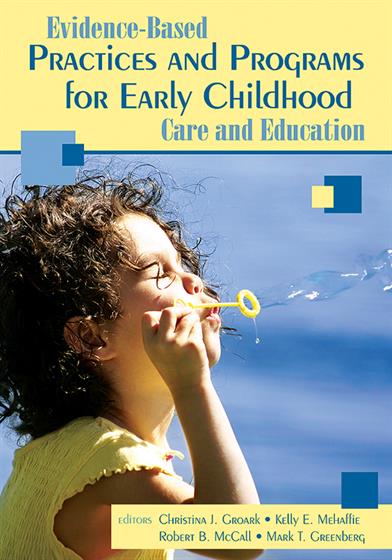Acknowledgments
About the Editors
About the Contributors
Introduction
Part I. Evidence-Based Practices
1. School Readiness: Definitions, Best Practices, Assessments, and Cost
The Importance of Early Learning
Definitions of School Readiness
The Intersection of Readiness Factors
Research Informing School Readiness Factors
Assessing Readiness
Costs and Savings of Being Ready for School
Conclusions and Recommendations
References
2. Early Intervention Practices for Children With and At Risk for Delays
Children At Risk for Delay Due to Poverty
English Language Learners At Risk for Delay
Children With Developmental Disabilities and Delays
Conclusions and Recommendations
References
3. Best Practices for Transitions Into Kindergarten
Transitions in Context
Best Practices for Transitions
Conclusions and Recommendations
References
Part II. Evidence-Based Programs
4. Publicly Funded Programs and Their Benefits for Children
Federal Programs
State Programs
Trends in Publicly Funded Early Childhood Programs
Conclusions and Recommendations
References
5. Demonstration Programs and Successful Outcomes
Randomized Experiments
Quasi-Experimental Studies
Characteristics of Successful Programs
Conclusions and Recommendations
References
6. Home-Based and Family Child Care: Characteristics and Quality Issues
Categories of Home-Based Facilities
Current Quality of Home-Based Facilities
Obstacles to Improving the Quality of Family Child Care
Characteristics of Improved Home-Based and Family Child Care Programs
Relative and Neighbor Care
Conclusions and Recommendations
Appendix 1: Overviews and Descriptions of the Early Childhood Environment Rating Scale (ECERS) and the Family Day Care Rating Scale (FDCRS)
References
7. School-Age Services: Programs That Extend the Benefits of Early Care and Education Services
Why Extend Early Childhood Programs?
Existing Extended Early Childhood Programs
Characteristics of Successful Programs
Conclusions and Recommendations
References
8. Out-of-School-Time Programs That Promote Academic and Behavioral Achievement for Children Ages 6 to 8
Outcomes and Evaluations of Out-Of-School-Time Programs
Academically Focused Programs
Reading and Mathematics Programs
Tutoring Programs
Summer Programs
Mental Health Focused Programs
Characteristics of Successful Programs
Quality Enhancement Tools and Initiatives
Conclusions and Recommendations
References
Part III. The Future of the Field
9. Professional Development and Higher Education Systems to Develop Qualified Early Childhood Educators
The Current State of Professional Development
Credentials Across Early Childhood Systems
Content of Credentials for Early Education and Care
Emerging Issues
Changes at the College Level
Professional Development Planning Groups
The Role of Professional Associations
Conclusions and Recommendations
References
Index



